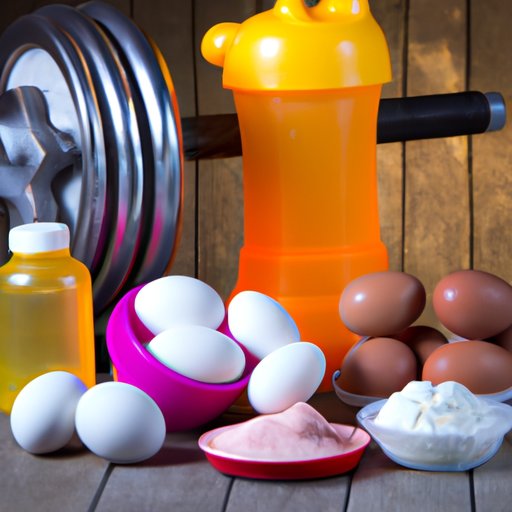
Introduction
Gaining weight can be a struggle for many people, especially those who are trying to build muscle. While there are many factors that contribute to weight gain, protein is one of the most important. In this article, we’ll explore how much protein you need to gain weight, and offer tips on optimizing your protein intake for muscle building.
The Protein Guide to Gaining Weight: Understanding Your Body’s Needs
Protein is essential for building muscle and repairing tissues in the body. There are two types of protein: complete and incomplete. Complete proteins are those that contain all nine essential amino acids, while incomplete proteins lack one or more of these essential amino acids. Good sources of complete protein include meat, fish, and dairy products. Incomplete proteins can be found in grains, legumes, and vegetables.
When it comes to muscle growth and repair, the quality of protein matters. The body can only use a certain amount of protein at one time, so it’s important to choose protein sources that are high in quality. This is why animal-based proteins are often recommended, as they are considered to be complete proteins.
The Science of Protein: How Much Do You Need to Pack on Pounds?
The recommended daily protein intake for gaining weight varies based on factors such as age, weight, and activity level. Generally, it’s recommended that adults consume between 0.8-1.2 grams of protein per kilogram of body weight per day. However, for those who are trying to gain weight and build muscle, it’s recommended to consume more protein, up to 2 grams per kilogram of body weight per day.
Protein synthesis is the process by which the body builds new muscle tissue. To maximize muscle growth, it’s important to ensure that the body has enough protein to support this process. Other factors that can affect protein requirements include training intensity, duration, and frequency.
Maximizing Muscle Growth: The Role of Protein in Weight Gain
To optimize protein intake for muscle growth, it’s recommended to consume protein throughout the day, rather than in one large meal. This helps to ensure a steady supply of protein to the body. In addition, it’s important to consume protein after exercise, as this is when the body is most receptive to muscle building.
While protein is an important macronutrient for muscle building, it’s not the only one. Carbohydrates and fats also play a key role in providing energy for workouts and supporting muscle growth.
The Importance of Protein for Building Lean Muscle Mass
Building lean muscle mass is an important goal for many people, as it can improve overall health and physical appearance. Protein is essential for building lean muscle mass, as it provides the building blocks necessary for muscle growth.
To optimize protein intake for building lean muscle mass, it’s recommended to consume protein during and after exercise, as well as throughout the day. It’s also important to choose high-quality protein sources, such as those found in animal-based foods.
Unlocking the Mystery of Protein and Weight Gain: What the Research Says
Research has consistently shown that protein intake is important for weight gain and muscle building. Studies have found that consuming higher amounts of protein can lead to greater gains in muscle mass, especially when combined with resistance training.
For example, a study published in the American Journal of Clinical Nutrition found that individuals who consumed 1.6 grams of protein per kilogram of body weight per day had greater gains in lean body mass than those who consumed less protein. Other studies have found similar results.
Beginner’s Guide to Protein: How Much Should You Eat to Build Muscle?
Determining how much protein you should eat to build muscle can be a bit tricky, as it depends on a number of factors. To calculate your protein needs, consider your age, gender, weight, and activity level. From there, you can determine how many grams of protein you need per day.
Some high-protein foods that are easy to incorporate into a diet plan include chicken, fish, Greek yogurt, eggs, and beans. It’s also important to plan your meals ahead of time to ensure that you’re getting enough protein throughout the day.
Conclusion
Increasing your protein intake is essential for gaining weight and building muscle. By understanding your body’s protein needs, choosing high-quality protein sources, and timing your protein intake appropriately, you can optimize your muscle growth and achieve your weight gain goals.
To get started, consider calculating your protein needs and incorporating protein-rich foods into your meals. With a little bit of planning and effort, you can transform your body and achieve your weight gain goals.




